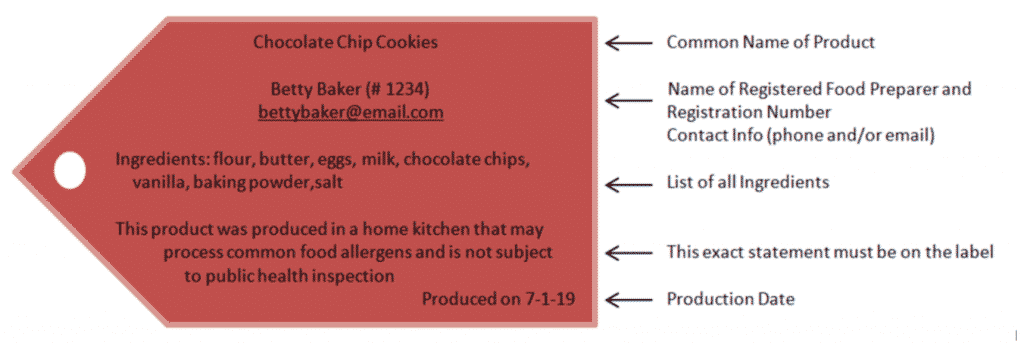Arkansas Cottage Food Laws allows individuals to make homemade products that are non-potentially hazardous and offer them for sale.
Arkansas does not require a license in order to begin which allows you to start now!
Kitchens where Cottage Food items are prepared are not required to be licensed or inspected by the health department.
State of Arkansas – Division of Agriculture
Table of Contents
ARKANSAS COTTAGE FOOD LAWS – Foods That Are Allowed
Arkansas Cottage Food Laws allow for the sale of non-potentially hazardous foods to be sold directly to the consumer without a permit as long as certain conditions are met.
For food to fall under this exemption, it must be sold directly to the consumer and it must be properly labeled.
- Bakery products
- Candy
- Fruit butters
- Jams
- Jellies
- Chocolate-covered fruit and berries that are not cut
Similar products specified in rules adopted by the Department of Health - Sugar-free jams, jellies, fruit butters and some candy and bakery products made with sugar substitutes are considered potentially hazardous food and may not be sold as a Cottage Food.
People interested in making and selling these products should contact the Arkansas Department of Health for information about what steps need to be taken to offer these items for sale.
The Department of Health can add other items to the list of Cottage Foods if they desire or state legislators can change the law. - In 2017, lawmakers amended the law to add chocolate covered, uncut fruit as an item that can be sold as a Cottage Food.
ARKANSAS COTTAGE FOOD LAWS UPDATED LIST
No Permit Required to Sell:
- Bakery Products (wide range of non-potentially hazardous foods)
- Brownies
- Cakes without cream icing
- Candy
- Cookies
- Fruit Butter
- Honey
- Commercially Pre-packaged Non-TCS Food
- Jam
- Jelly
- Chocolate-covered fruit and berries
- Maple Syrup
- Sorghum
- Whole, Uncut Fruits/Vegetable

ARKANSAS COTTAGE FOOD LAWS – PROHIBITED FOODS
Potentially hazardous foods that require time and/or temperature control for safety are not allowed to be produced under the cottage food laws.
Permit Required to Sell
The following require a license and must be made inside a commercial kitchen / commissary that is inspected by the health department:
- Anything requiring handling, bagging, dividing, portioning, weighing, etc
- Anything requiring refrigeration
- Canned foods
- Cheesecake
- Cream Cheese based Frosting or Filling
- Cream Pies and Cream Filled Items
- Cured Meats
- Custard Pies
- Dried Fruit/Vegetables/Herbs/Spices
- Salsa
- Dried Meats
- Juices
- Meringue Pies
- Milled Grain/Flour/Meal
- Pickled Vegetables
- Salad
- Shelled Peas or Nuts
- Sliced Fruit or Vegetables
- Smoked Meats
- Sprouted Beans
- Sprouted Seeds
Real Life Cottage Food Entrepreneurs and Opportunities
- Cakes – teacher turns kitchen into bakery
- Doughnuts – cottage mini donut vendor
- Fruit jams and jellies – See Additional Requirements Here
- Kettle corn – real kettle corn vendors from home
- Popcorn (plain and flavored) – see a real home vendor here
- Talk and Join hundreds of others here: VendorsUnited.com
ACIDITY LEVELS AND TESTING
Arkansas doesn’t require testing but their cottage food laws state that they can request samples of your product(s).
Most states determine if a food is non-potentially hazardous by the acidity level found in the food. The higher the acidity, the more stable at a range of temps, that food product is.
For example: milk is low acidity and requires temperature controls.
The acidity of foods is measured by pH.
• The range of pH is commonly considered to extend from zero to 14. A pH value of 7 is neutral because pure water has a pH value of exactly 7. Values less than 7 are considered acidic, while those greater than 7 are considered basic or alkaline.
• All fruits are acidic foods and are usually tart and sour. Ex: tomato, lemon, peach, apple, etc.
• The FDA rule for acidic foods states that a food must have a pH below 4.6 to be sold as a minimally processed food.
• Reason for this is bacteria does not grow at this level of acidity.
• The exclusion shall not be construed as allowing the sale of low acid foods (pH > 4.6) in
hermetically sealed containers (i.e. home-canned green beans, peas, etc.) when such
food is not prepared in a permitted establishment. *Exceptions for Montgomery and Calhoun Counties.
TESTING
Some states require testing if the pH level is unknown. For many food products, the pH level is already known.
You can test for pH yourself using a pH spear tester. (make sure it is made for food and has a long spear tip).
Oklahoma State University shares an awesome guide for selecting the correct tester for foods and liquids which includes tips and tricks for operation and maintenance. Get The Guide Here.
WHERE CAN YOU SELL COTTAGE FOODS
Cottage food items can only be sold direct from the manufacturer to the consumer either from the site where the food is made, at a physical or on-line farmer’s market, a county fair, special event, or at a pop-up shop within another established business.
As of 2021, online sales of cottage food items ARE allowed in Arkansas.
What is a “Pop-Up Shop”
A cottage food production operation selling items in an unaffiliated established business for a limited time period with the consent of the owner of the unaffiliated established business and the owner or employee of the cottage food production operation is present at the point of sale.
Inside kitchenincome.com you can find out how many cottage food entrepreneurs are getting sales faster than they can make the food.
HOW TO START YOUR COTTAGE FOOD BUSINESS IN ARKANSAS – START TODAY
NO LICENSE – NO TESTS – JUST GRAB A BUSINESS LICENSE AND START
Some cities don’t require a business license but you definitely should check before starting.
To do this, simply contact your city office / county office and let them know that you’ll be offering foods under the Arkansas Cottage Food Laws and if this will require a business license.
A business license (if required) will start at about $50.00.
ARKANSAS COTTAGE FOOD LAWS LABELING REQUIREMENTS
Most states require labeling on any product produced at a home kitchen. However, even if your state doesn’t require labeling, this is your chance to stand out and show you care.
The Arkansas Cottage Food Laws requires the following on labels:
Cottage Foods must be labeled with the name and address of the manufacturer, the name of the product and the ingredients in the product.
Nutritional claims are not allowed. In addition to ingredients and manufacturer information, the label must include this statement in 10-point type: “This Product is Home-Produced.”
Below is an example of what the state of Arizona requires on their labels.
Using VistaPrint.com or similar – you can quickly create professional labels that not only serve to meet the state cottage food guidelines but also serve for marketing your awesome business and products.
You’ll find some fantastic examples of this from members inside VendorsUnited.com

ALLERGENS ON LABELING
The FDA lists nine (9) major food allergens. Listing any of these on your label is a smart business practice and will certainly help your customers choose a product.
- Milk
- Eggs
- Fish (e.g., bass, flounder, cod)
- Crustacean shellfish (e.g., crab, lobster, shrimp)
- Tree nuts (e.g., almonds, walnuts, pecans)
- Peanuts
- Wheat
- Soybeans
- Sesame
Simply add to your label: “NOTICE: SOYBEANS USED IN THIS RECIPE” Some go as far to announce that a certain allergen is used in the same kitchen.
Some states require you list any potential allergens and potential for any cross contamination even if the allergen is not used in the recipe.
cOTTAGE FOOD TIPS AND BEST PRACTICES
SAFE PRACTICES
Much of this may seem like common sense, but even if you already know, it’s a good idea to remind yourself with a list of things that can prevent you from missing something small.
And if for no other reason… CYA! CYA = Cover Your A#%
CLEAN WORK AREA / WORK SPACE / SANITIZATION
Providing safe to eat foods from your kitchen – starts in your kitchen.
Keep your area clean and sanitized to avoid cross contamination and to insure you provide your customers and clients with the safest and best foods they can get.
The following are some “common” sense things you can do to insure the best environment for preparing foods to sell:
- Keep all equipment and surface areas clean and sanitized
- Make sure window and door screens are bug proof with no gaps
- Keep ingredients separate to prevent cross contamination / e.g. raw eggs near flour
- No pets in work area and preferably none in the home
- Allow no-one with a cold, sniffles or sick in kitchen while preparing foods
- Wipe down walls and clean floors daily
- Use good lighting to avoid missing unclean areas
- Keep window and door screens in good repair to keep insects out
- Wash hands frequently while working and use food grade gloves for extra safety
- Keep areas of food storage and equipment storage clean and sanitized
RECORD KEEPING
Why keep these types of records?
Let’s say the inspector calls you and says they got a report that your banana bread, someone purchased, made them sick.
You’ll be able to show that you didn’t even make banana bread that week and that the person who reported you, bought that 4 weeks ago and you weren’t even the one that sold it to him.
This does not need to be complicated. I love my yellow legal pads and they make an inexpensive tool for keeping up with the following:
- The recipes you use including ingredients
- The process you use to prepare that specific recipe: (can be just like recipe instructions)
- Date made (can be coded for your own use only if your state doesn’t require the production date) e.g. Made 12.22.29 = 292212
- Date sold (you can have a batch code to help track a certain batch) Simply write down date you sold an item
- Location sold is another great piece of information to keep track of
- Sales receipts are something great to keep for a couple of reasons and over at KitchenIncome.com I dive into the best practices, best systems and best methods for tracking, managing, selling and shipping.
COTTAGE FOOD lIABILITY INSURANCE
We live in a society that likes to sue. I can sue you for wearing that color shirt. No kidding!
Of course I probably won’t win, but at the very least, it’s gonna cause you stress and some costs.
Liability insurance is a MUST.
It can be expensive – but several years ago, I found FLIP and by far, they gave me the most protection (coverage) and allow you to run your cottage food business without fear of being sued.
WHY? Because they provide the lawyers. And their lawyers… they are good!
Of course you should price shop around with your local agent or a national brand company, but rest assured, I’ve done all the legwork for you.
Alternatively, some folks opt to get bonded. You’ve heard the saying before: “licensed and bonded”. A bond is usually provided from an insurance bonding company or your own insurance company.
My first time, I got a bond at State Farm.
A bond is expensive comparatively but is less out of pocket in the beginning. Of course, it’s way, way less insurance / coverage too.
A $10,000 bond may cost $50 annually while a $2,000,000.00 liability policy may cost a few hundred a year.
No matter what you decide… knowing you’re insured against frivolous lawsuits is worth every penny.
ARKANSAS COTTAGE FOOD RESOURCES
- Arkansas Food Freedom Act
- The Arkansas Homemade Food Production Guidelines
- Arkansas County Health Units (for questions on cottage food laws)
CONTACT ARKANSAS’ COTTAGE FOOD INDUSTRY FOR MORE HELP
Arkansas Department of Health
Environmental Health
4815 West Markham Street
Little Rock, AR 72205
501-661-2000
UPDATES TO ARKANSAS COTTAGE FOOD LAWS
From time to time, links, info, rules and numbers change, are updated or made obsolete.
Although I spend time daily with hundreds of vendors (many of which are cottage food businesses) – I can miss an update.
If you find a broken link or outdated state information… please let me know and I’ll send you a special thank you for helping me maintain the best site on the internet for the cottage food industry.
My goal has always been to have a central place that is absolutely free for for those starting out or existing entrepreneurs who use their homes and kitchens to make real incomes.
Please send to [email protected] / or post inside the private VendorsUnited.com group.
Need more resources? Check it out HERE (Helpful Resources)
Take a peek at the best vendors on the planet, the community that rocks the food vending world: Vendors United…

Disclaimer
This information is provided to help those interested in starting a cottage food business. It is not a document made by the state government. This information is not provided as law nor should be construed as law. Always use the contact information for each state to confirm compliance and any changes.
Did we help you? Help us to share this information…
 WATCH VIDEO!
WATCH VIDEO! WATCH VIDEO!
WATCH VIDEO!